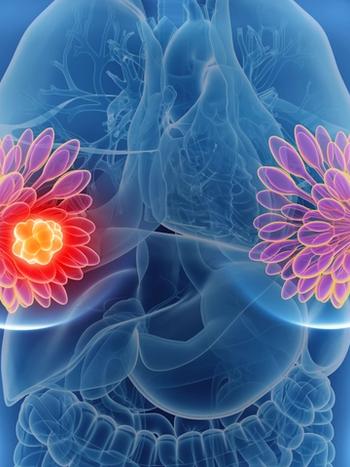
Osimertinib Plus Chemotherapy Gains European Approval for EGFR+ NSCLC
Findings from the phase 3 FLAURA2 trial support the European approval of osimertinib/chemotherapy in EGFR-mutated non–small cell lung cancer.
The European Union (EU) has approved osimertinib (Tagrisso) in combination with chemotherapy as a first-line treatment for patients with EGFR-mutated advanced non–small cell lung cancer (NSCLC), according to a press release from the developers, AstraZeneca.1
Specifically, the combination is indicated for use in patients whose tumors harbor exon 19 deletions or exon 21 mutations.
Approval for the combination therapy is supported by efficacy results from the phase 3 FLAURA2 trial (NCT04035486).2 Investigator-assessed median progression-free survival (PFS) was 25.5 months in the osimertinib/chemotherapy arm vs 16.7 months in the osimertinib monotherapy arm (HR, 0.62; 95% CI, 0.49-0.79; P < 0.0001). Findings from the blinded independent central review were consistent with investigator assessment (HR, 0.62; 95% CI, 0.48-0.80). Additionally, PFS at 24 months occurred in 57% (95% CI, 50%-63%) of patients in the osimertinib/chemotherapy arm and 41% (95% CI, 35%-47%) of patients in the monotherapy arm.
“Today’s news marks a significant advance for patients with EGFR-mutated lung cancer in Europe, providing a new first-line treatment option with osimertinib now in combination with chemotherapy,” lead trial investigator David Planchard, MD, PhD, thoracic oncologist at Gustave Roussy Institute of Oncology, said in a news release on the approval.1 “The FLAURA2 results build on the established efficacy of osimertinib monotherapy, showing a meaningful 9-month improvement in [PFS] and offering physicians the option to tailor treatment to a patient’s specific needs.”
In total, 557 patients were randomly assigned to the osimertinib/chemotherapy group (n = 279) or the osimertinib monotherapy group (n = 278) between June 1, 2020, and December 22, 2021. Of those patients, 6 received no treatment, 276 received osimertinib plus platinum-containing chemotherapy and pemetrexed, and 275 received osimertinib monotherapy.
Patients received a median of 4 cycles (range, 1-6) of carboplatin or cisplatin in the combination group, with 211 patients completing the planned cycles of carboplatin or cisplatin, and a median of 12 cycles (range, 1-48) of pemetrexed. 154 patients were receiving osimertinib and 68 were receiving pemetrexed in the combination therapy as of the data-cutoff date; 123 patients in the monotherapy group were receiving osimertinib.
The primary end point was investigator-assessed PFS. Secondary end points included overall survival (OS), objective response rate (ORR), duration of response, disease control, depth of response, and second PFS. An additional exploratory end point was safety.
Investigator-assessed ORR was 83% in the combination group (95% CI, 78%-87%) and 76% (95% CI, 70%-80%) in the monotherapy group. Blinded independent central review reported responses in 92% (95% CI, 88%-95%) and 83% (95% CI, 78%-87%), respectively. Investigator-assessed disease progression or death occurred in 120 patients in the combination arm and 166 in the osimertinib group.
At 12 months, the OS rate was 89% (95% CI, 84%-92%) and 92% (95% CI, 88%-95%) in the combination and monotherapy arms, respectively. At 24 months, the rates were 79% (95% CI, 73%-83%) and 73% (95% CI, 67%-78%).
Any-grade adverse effects (AEs) occurred in all 276 patients in the combination arm and 268 patients in the monotherapy arm. AEs of grade 3 or higher occurred in 176 patients of the combination arm and 75 patients in the monotherapy arm. Serious AEs were reported in 104 patients and 53 patients in the combination and monotherapy arms, respectively.
The
References
- Tagrisso with the addition of chemotherapy approved in the EU as new 1st-line treatment for patients with EGFR-mutated advanced lung cancer. News release. AstraZeneca. Published July 5, 2024. Accessed July 9, 2024. https://tinyurl.com/c6rcjwe6
- Planchard D, Jänne PA, Cheng Y, et al. Osimertinib with or without chemotherapy in EGFR-mutated advanced NSCLC. N Engl J Med. 2023;389(21):1935-1948. doi:10.1056/NEJMoa2306434
- FDA approves osimertinib with chemotherapy for EGFR-mutated non-small cell lung cancer. News release. FDA. February 16, 2024. Accessed July 9, 2024. https://bit.ly/49AeXjy
Newsletter
Stay up to date on recent advances in the multidisciplinary approach to cancer.




































